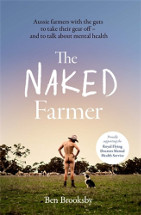The naked farmer by Ben Brooksby

Pan Macmillan, 2020. ISBN: 9781760981068.
(Age: 17+) In 2017, Ben Brooksby posted a photograph of himself on
social media. The photograph showed him lying naked on lentils in a
truck. At first, he thought that his followers might learn about the
importance of agriculture, but his own recovery from anxiety attacks
after a difficult childhood suggested another goal. Ben founded the
Naked Farmer movement to encourage people in rural areas to speak up
about their experiences of mental illness.
In The naked farmer, Ben has assembled thirty-two stories
about men and women who have confronted challenges ranging from
grief, depression and chronic illness to marriage breakdown and the
disclosure of same-sex attraction. Any of these experiences would be
difficult to deal with in a city but in the country, sufferers can
face the additional problems of loneliness, a culture of stoicism
and remoteness from health facilities. This book does not provide
expert medical opinion. Instead, it presents a variety of
experiences of mental illness and the ways in which sufferers have
dealt with them. Common threads emerge, including the need to
discuss the problem with an understanding relative, friend or health
professional, and the eventual realisation that every life has
value. Some of the stories are told in the first person and one has
been written in verse, but most have been reported by Ben and a team
of storytellers. All the stories are told in a down-to-earth style
that readers can experience as conversations with or about people
who have revealed that they have been mentally ill. Their bravery
explains the photographs. Ben believes that just as it takes courage
to be photographed naked, it also requires courage to both admit to
having a mental health problem and ask for help.
Ben Brooksby calls his book a 'conversation starter'. The naked
farmer will have served its purpose if it encourages people
who work in agriculture to discuss their mental health issues. It
may also provide other Australians with insights into some of the
difficulties confronting those who live in rural areas.
Elizabeth Bor